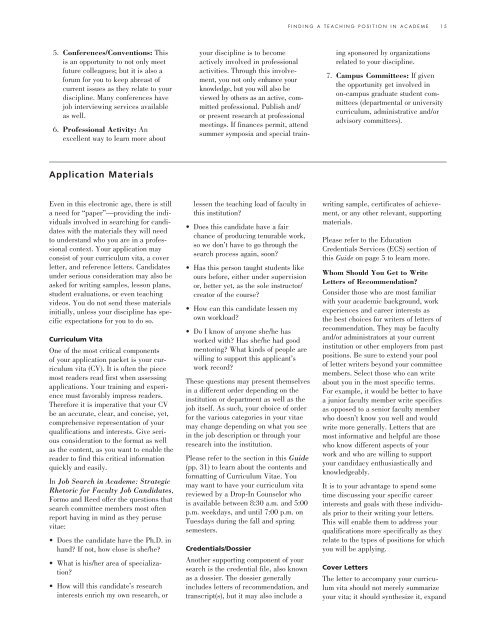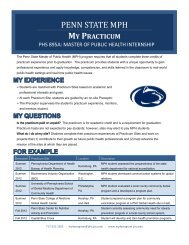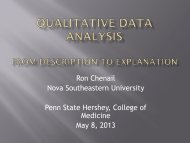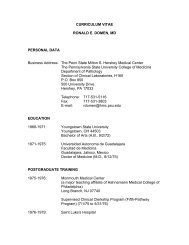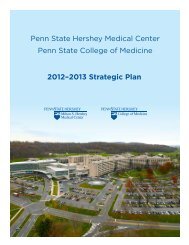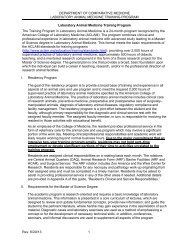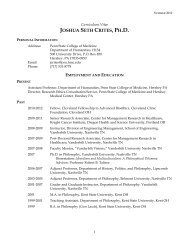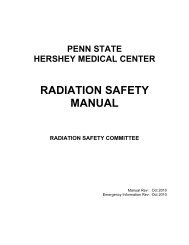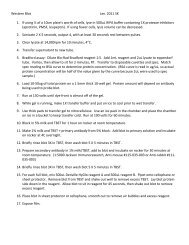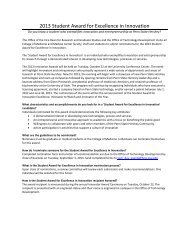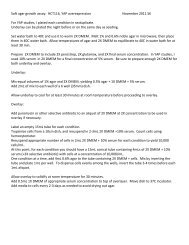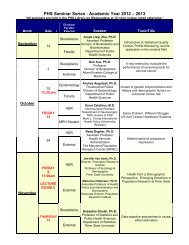Penn State Graduate Student Career Guide - Biomedical Sciences ...
Penn State Graduate Student Career Guide - Biomedical Sciences ...
Penn State Graduate Student Career Guide - Biomedical Sciences ...
Create successful ePaper yourself
Turn your PDF publications into a flip-book with our unique Google optimized e-Paper software.
FINDING A TEACHING POSITION IN ACADEME 15<br />
5. Conferences/Conventions: This<br />
is an opportunity to not only meet<br />
future colleagues; but it is also a<br />
forum for you to keep abreast of<br />
current issues as they relate to your<br />
discipline. Many conferences have<br />
job interviewing services available<br />
as well.<br />
6. Professional Activity: An<br />
excellent way to learn more about<br />
your discipline is to become<br />
actively involved in professional<br />
activities. Through this involvement,<br />
you not only enhance your<br />
knowledge, but you will also be<br />
viewed by others as an active, committed<br />
professional. Publish and/<br />
or present research at professional<br />
meetings. If finances permit, attend<br />
summer symposia and special training<br />
sponsored by organizations<br />
related to your discipline.<br />
7. Campus Committees: If given<br />
the opportunity get involved in<br />
on-campus graduate student committees<br />
(departmental or university<br />
curriculum, administrative and/or<br />
advisory committees).<br />
Application Materials<br />
Even in this electronic age, there is still<br />
a need for “paper”—providing the individuals<br />
involved in searching for candidates<br />
with the materials they will need<br />
to understand who you are in a professional<br />
context. Your application may<br />
consist of your curriculum vita, a cover<br />
letter, and reference letters. Candidates<br />
under serious consideration may also be<br />
asked for writing samples, lesson plans,<br />
student evaluations, or even teaching<br />
videos. You do not send these materials<br />
initially, unless your discipline has specific<br />
expectations for you to do so.<br />
Curriculum Vita<br />
One of the most critical components<br />
of your application packet is your curriculum<br />
vita (CV). It is often the piece<br />
most readers read first when assessing<br />
applications. Your training and experience<br />
must favorably impress readers.<br />
Therefore it is imperative that your CV<br />
be an accurate, clear, and concise, yet,<br />
comprehensive representation of your<br />
qualifications and interests. Give serious<br />
consideration to the format as well<br />
as the content, as you want to enable the<br />
reader to find this critical information<br />
quickly and easily.<br />
In Job Search in Academe: Strategic<br />
Rhetoric for Faculty Job Candidates,<br />
Formo and Reed offer the questions that<br />
search committee members most often<br />
report having in mind as they peruse<br />
vitae:<br />
• Does the candidate have the Ph.D. in<br />
hand? If not, how close is she/he?<br />
• What is his/her area of specialization?<br />
• How will this candidate’s research<br />
interests enrich my own research, or<br />
lessen the teaching load of faculty in<br />
this institution?<br />
• Does this candidate have a fair<br />
chance of producing tenurable work,<br />
so we don’t have to go through the<br />
search process again, soon?<br />
• Has this person taught students like<br />
ours before, either under supervision<br />
or, better yet, as the sole instructor/<br />
creator of the course?<br />
• How can this candidate lessen my<br />
own workload?<br />
• Do I know of anyone she/he has<br />
worked with? Has she/he had good<br />
mentoring? What kinds of people are<br />
willing to support this applicant’s<br />
work record?<br />
These questions may present themselves<br />
in a different order depending on the<br />
institution or department as well as the<br />
job itself. As such, your choice of order<br />
for the various categories in your vitae<br />
may change depending on what you see<br />
in the job description or through your<br />
research into the institution.<br />
Please refer to the section in this <strong>Guide</strong><br />
(pp. 31) to learn about the contents and<br />
formatting of Curriculum Vitae. You<br />
may want to have your curriculum vita<br />
reviewed by a Drop-In Counselor who<br />
is available between 8:30 a.m. and 5:00<br />
p.m. weekdays, and until 7:00 p.m. on<br />
Tuesdays during the fall and spring<br />
semesters.<br />
Credentials/Dossier<br />
Another supporting component of your<br />
search is the credential file, also known<br />
as a dossier. The dossier generally<br />
includes letters of recommendation, and<br />
transcript(s), but it may also include a<br />
writing sample, certificates of achievement,<br />
or any other relevant, supporting<br />
materials.<br />
Please refer to the Education<br />
Credentials Services (ECS) section of<br />
this <strong>Guide</strong> on page 5 to learn more.<br />
Whom Should You Get to Write<br />
Letters of Recommendation?<br />
Consider those who are most familiar<br />
with your academic background, work<br />
experiences and career interests as<br />
the best choices for writers of letters of<br />
recommendation. They may be faculty<br />
and/or administrators at your current<br />
institution or other employers from past<br />
positions. Be sure to extend your pool<br />
of letter writers beyond your committee<br />
members. Select those who can write<br />
about you in the most specific terms.<br />
For example, it would be better to have<br />
a junior faculty member write specifics<br />
as opposed to a senior faculty member<br />
who doesn’t know you well and would<br />
write more generally. Letters that are<br />
most informative and helpful are those<br />
who know different aspects of your<br />
work and who are willing to support<br />
your candidacy enthusiastically and<br />
knowledgeably.<br />
It is to your advantage to spend some<br />
time discussing your specific career<br />
interests and goals with these individuals<br />
prior to their writing your letters.<br />
This will enable them to address your<br />
qualifications more specifically as they<br />
relate to the types of positions for which<br />
you will be applying.<br />
Cover Letters<br />
The letter to accompany your curriculum<br />
vita should not merely summarize<br />
your vita; it should synthesize it, expand


